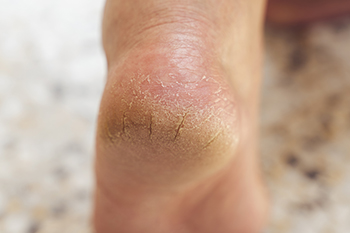Connect With Us
Blog

Tennis players are at risk for various foot and ankle injuries due to the sport’s fast-paced lateral movements and frequent pivoting. Among the most common tennis injuries are ankle sprains, Achilles tendonitis, plantar fasciitis, and stress fractures. These conditions can result from repetitive impact, poor foot alignment, or sudden changes in direction on hard courts. For example, an ankle sprain occurs when the ligaments surrounding the ankle are overstretched or torn, often after a quick pivot or awkward landing. Achilles tendonitis and plantar fasciitis are overuse injuries that affect the soft tissues in the heel and can lead to chronic pain if left untreated. Stress fractures, which are hairline cracks in the bones, result from repetitive pounding of the feet during play. A podiatrist can use diagnostic imaging to confirm the exact type and extent of the injury. Depending on the diagnosis, medical treatment may include immobilization, custom orthotic support, anti-inflammatory medication, or surgery for more serious cases. If you experience foot or ankle pain after playing tennis, it is suggested that you make an appointment with a podiatrist for an exam, diagnosis, and treatment.
Sports related foot and ankle injuries require proper treatment before players can go back to their regular routines. For more information, contact William Beaton, DPM of Advanced Podiatry and Wound Care. Our doctor can provide the care you need to keep you pain-free and on your feet.
Sports Related Foot and Ankle Injuries
Foot and ankle injuries are a common occurrence when it comes to athletes of any sport. While many athletes dismiss the initial aches and pains, the truth is that ignoring potential foot and ankle injuries can lead to serious problems. As athletes continue to place pressure and strain the area further, a mild injury can turn into something as serious as a rupture and may lead to a permanent disability. There are many factors that contribute to sports related foot and ankle injuries, which include failure to warm up properly, not providing support or wearing bad footwear. Common injuries and conditions athletes face, including:
- Plantar Fasciitis
- Plantar Fasciosis
- Achilles Tendinitis
- Achilles Tendon Rupture
- Ankle Sprains
Sports related injuries are commonly treated using the RICE method. This includes rest, applying ice to the injured area, compression and elevating the ankle. More serious sprains and injuries may require surgery, which could include arthroscopic and reconstructive surgery. Rehabilitation and therapy may also be required in order to get any recovering athlete to become fully functional again. Any unusual aches and pains an athlete sustains must be evaluated by a licensed, reputable medical professional.
If you have any questions please feel free to contact our office located in St. Petersburg, FL . We offer the newest diagnostic and treatment technologies for all your foot and ankle needs.

Custom Orthotics aren't just about comfort; they're your shield against injury and fatigue. By aligning your feet just right, they reduce strain on muscles and joints, ensuring you stay active longer without the usual wear and tear. Whether you're an athlete pushing limits or someone seeking day-to-day ease, Custom Orthotics offer the support you need. Don't let fatigue set the pace; with Custom Orthotics, you're always one step ahead. Call today for more information.

Cracked heels, or heel fissures, occur when the skin on the bottom of the feet becomes excessively dry and splits under pressure. Initially, these cracks may be superficial, causing minimal discomfort. However, without proper care, heel fissures can deepen, leading to pain, bleeding, and an increased risk of infection. Factors contributing to cracked heels include prolonged standing, wearing open-back shoes, walking barefoot, obesity, and medical conditions such as diabetes. Symptoms often involve discomfort while standing or walking, itching, and visible flaking of the skin. To address this issue, a podiatrist can remove thickened skin, apply dressings to minimize skin movement, and recommend appropriate footwear to alleviate pressure on the heels. If you have painful heel fissures, it is suggested that you schedule an appointment with a podiatrist for an exam and appropirate treatment.
Cracked heels are unsightly and can cause further damage to your shoes and feet. If you have any concerns, contact William Beaton, DPM from Advanced Podiatry and Wound Care. Our doctor can provide the care you need to keep you pain-free and on your feet.
Cracked Heels
Cracked heels appear unappealing and can make it harder for you walk around in sandals. Aside from looking unpleasant, cracked heels can also tear stockings, socks, and wear out your shoes. There are several methods to help restore a cracked heel and prevent further damage.
How Do You Get Them?
Dry skin is the number one culprit in creating cracked heels. Many athletes, walkers, joggers, and even swimmers suffer from cracked heels. Age and skin oil production play a role to getting cracked heels as well.
Promote Healing
Over the counter medicines can help, especially for those that need instant relief or who suffer from chronic dry feet.
Wear Socks – Wearing socks with medicated creams helps lock in moisture.
Moisturizers – Applying both day and night will help alleviate dryness which causes cracking.
Pumice Stones – These exfoliate and remove dead skin, which allows for smoother moisturizer application and better absorption into the skin.
Change in Diet
Eating healthy with a well-balanced diet will give the skin a fresh and radiant look. Your body responds to the kinds of food you ingest. Omega-3 fatty acids and zinc supplements can also revitalize skin tissue.
Most importantly, seek professional help if unsure how to proceed in treating cracked heels. A podiatrist will help you with any questions or information needed.
If you have any questions, please feel free to contact our office located in St. Petersburg, FL . We offer the newest diagnostic and treatment technologies for all your foot care needs.

Foot orthotics provide essential support and protection for athletes and individuals engaging in physical activities. They help improve alignment, reduce stress on joints, and enhance overall foot function, allowing for better performance and reduced risk of injury. By providing proper arch support and shock absorption, orthotics minimize strain on muscles and ligaments, preventing common issues such as plantar fasciitis and shin splints. They also promote stability and balance, which are essential for agility and endurance in sports. Custom orthotics can address specific biomechanical concerns, ensuring optimal movement efficiency and comfort. With improved foot mechanics, individuals can engage in activities for longer durations without discomfort. Wearing orthotics as part of a sports routine enhances overall comfort, reduces fatigue, and supports long-term joint and muscle health. If you have foot pain while participating in sports or physical activities, it is suggested that you visit a podiatrist who can recommend the right type of orthotics for you.
If you are experiencing discomfort in your feet and would like to try custom orthotics, contact William Beaton, DPM from Advanced Podiatry and Wound Care. Our doctor can provide the care you need to keep you pain-free and on your feet.
What Are Custom Orthotics?
Custom orthotics are inserts you can place into your shoes to help with a variety of foot problems such as flat feet or foot pain. Orthotics provide relief and comfort for minor foot and heel pain.
Over-the-Counter Inserts
Shoe inserts come in a wide variety and are used to treat foot pain, heel pain, and minor problems. For example, arch supports can be inserted into your shoes to help correct overarched or flat feet, while gel insoles are often used because they provide comfort and relief from foot and heel pain by alleviating pressure.
Prescription Orthotics
If over-the-counter inserts don’t work for you or if you have a more severe foot concern, it is possible to have your podiatrist prescribe custom orthotics. These high-quality, custom inserts are designed to treat problems such as abnormal motion, plantar fasciitis, and severe forms of heel pain. They can even be used to help patients suffering from diabetes by treating foot ulcers and painful calluses and are usually molded to your feet individually, which allows them to provide full support and comfort.
If you're experiencing minor to severe foot or heel pain, it’s recommended to speak with your podiatrist about the possibility of using custom orthotics or shoe inserts. A podiatrist can determine which type of custom orthotic or shoe insert is right for you and help you take the first steps toward being pain-free.
If you have any questions please contact our office located in St. Petersburg, FL . We offer the newest diagnostic and treatment technologies for all your foot and ankle needs.
